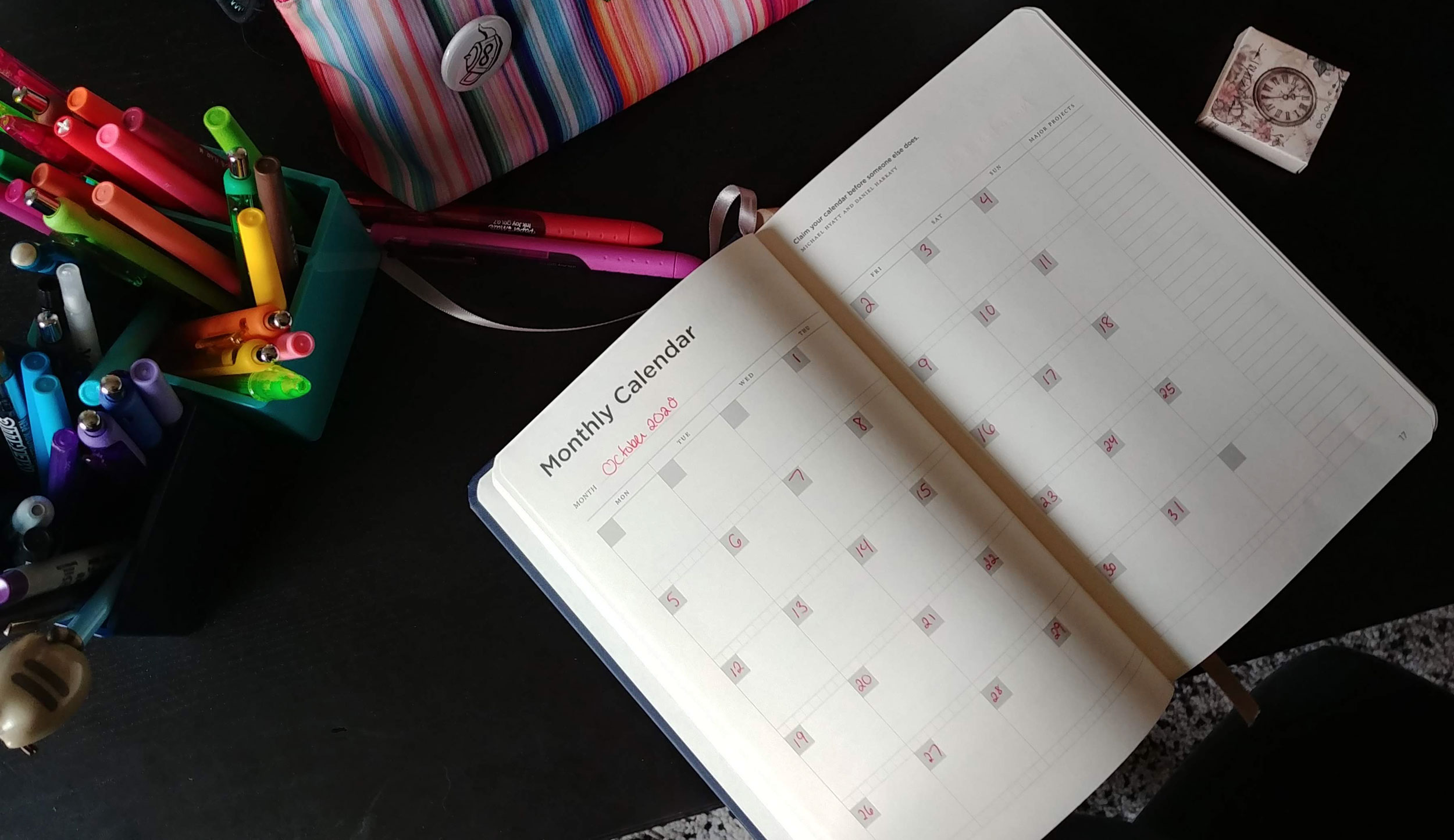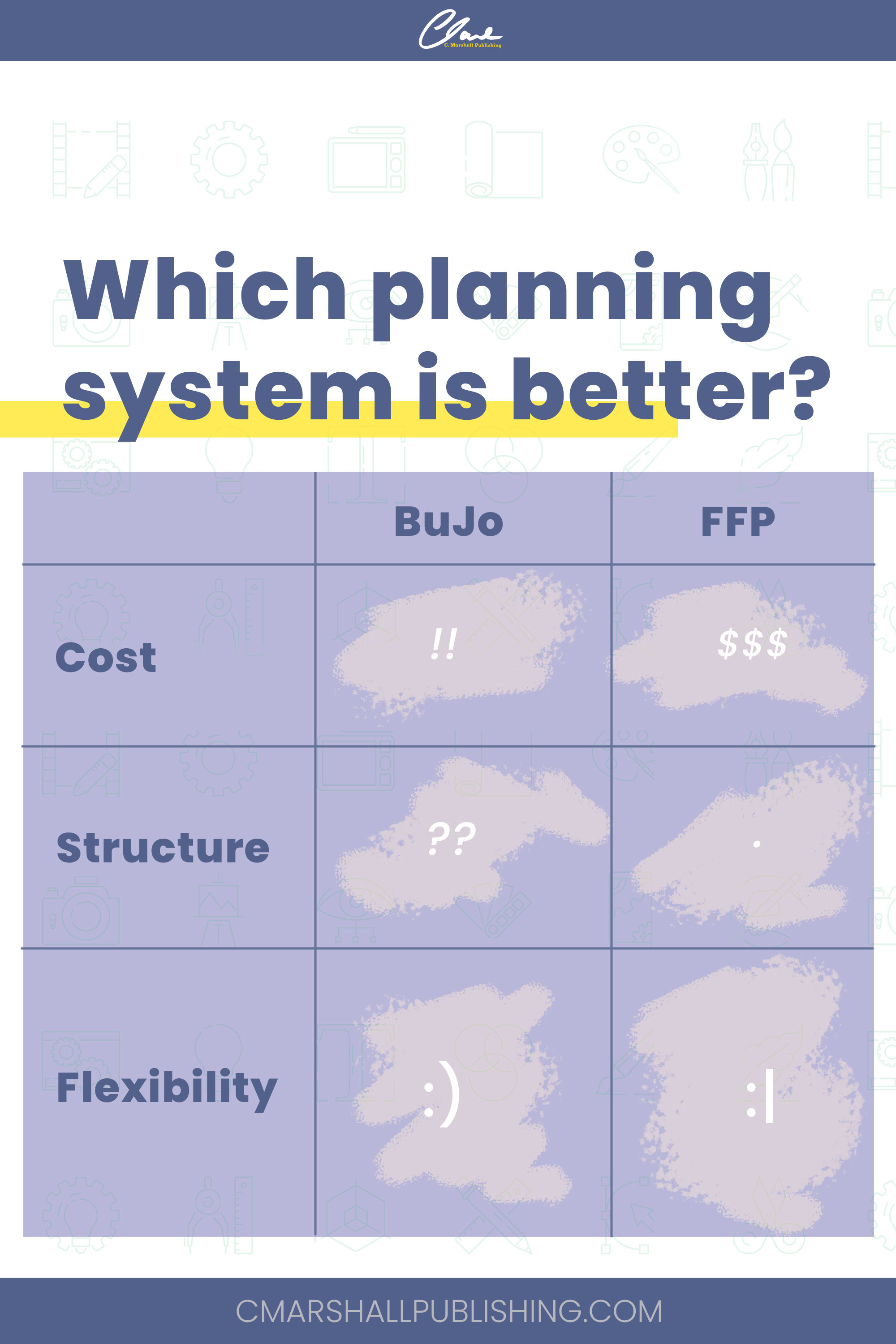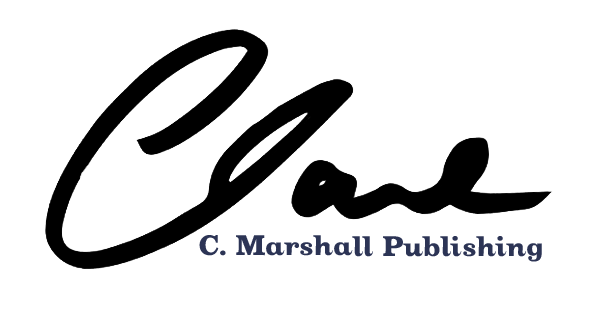It's the beginning of a new year. Or maybe a new era or season. You're ready to buckle down and recommit to those pesky, nagging goals that for some reason, you can't seem to accomplish.
I've used the Full Focus planner system and I've been a long-term bullet journal user, so today I want to compare the two systems and give the rundown on the full focus planner vs. bullet journaling.
Which one is better - for you?

Summary review of the Full Focus Planner & the Bullet Journaling system
Pros of the Full Focus Planner
Cons of the Full Focus Planner
Pros of the Bullet Journaling System
Cons of the Bullet Journaling System
Brief: My experience with Full Focus Planner & the Bullet Journal systems
Full Focus Planner experience
I thoroughly laid out my experience with the Full Focus Planner here. And I really enjoyed it! The notebook is weighty, the paper smells good, it forces you to prioritize, and there's (some) room to write down your thoughts each day.
So why did my usage trickle off towards the end of the three months?
Bullet Journal experience
When I say I was a devotee to the bullet journal, the bullet journal purist may turn up their nose at my colourful washi-tape decoration and my "inaccurate" use of the ticks, x's, and other "proper" notations laid out in the official system.
But, the great thing about the bullet journal system is it's adaptable. I spent years (off and on) keeping track of client projects, personal tasks, and writing habits in my bullet journal. I devoted a good hour every Sunday afternoon or evening to planning the week ahead. It became a comforting ritual that reinforced its usage every weekday.
If I loved it so much, why did I stop using it?
Well...
If you're new here...
Hey there! Welcome! My name is Clare, I’m the author-publisher behind the young adult science fiction & fantasy publisher, Faery Ink Press.
Each month I blog about a specific behind-the-scenes project or campaign I carry out on my very real publishing company—and share all the messy feelings and results with you, the creative reader.
Is the Full Focus Planner system for you?
In this section, we'll explore:
- What the Full Focus Planner is
- The benefits of using the Full Focus Planner
- The downsides of the planner
What is the full focus planner?
The Full Focus Planner is a 90-day notebook with done-for-you templates designed to maximize your productivity at work. It was created by Michael Hyatt's company Full Focus and utilizes many productivity concepts and tools, such as:
- Daily Big Three: choose three important tasks to prioritize and do those first
- Weekly Review: a process by which you review your week, highlight your achievements, and document what you can improve upon in the following weeks.
...as well as regular habit tracking and goal setting.
Full Focus Planner benefits: why it could be the system for you
Pro 1: 90 day done-for-you system with prompts
There's relief in having done-for-you templates and systems in place so when you sit down for the day, all you have to do is, well, follow the directions, do your work, and then hopefully at the end of the day, you feel productive.
Each day has two dedicated pages for your tasks and notes. The planner is undated, so you can use it for whichever 90-day period you like. Each week, you review your progress by answering questions in the Weekly Review. And then, hopefully, you take those newfound insights and integrate them into next week's work (I had trouble doing this!).
Pro 2: Finite, high-quality, bound notebook with lay-flat binding
If you're a stationary nerd like me, you appreciate quality paper goods. Sure, this is a small benefit in the scope of this article, but actually having a notebook that lays flat? That accepts your ink, without bleed?
*chef's kiss*

Caption: Full Focus Planner opened flat on a black table, surrounded by organized markers and pens.
Pro 3: Templates for tracking habits, reviewing progress, and prioritizing tasks
At the front of the Full Focus Planner, there are dedicated pages for you to track habits and achievement goals. Answer the prompts, write down what you want to achieve, how you'll reward yourself, and commit! Then, review and evaluate your progress every week. Writing down your tasks every day also forces you to choose your three most important to-dos for the Big Three spots.
Okay. The benefits of the Full Focus Planner are clear. What about the downsides?
Full Focus Planner Downsides: Why this system may not work for you
Con 1: The Full Focus Planner is expensive
Shipping cost alone (especially to a non-US country) is enough to make one pause. I know a thing or two about shipping books and yeah, it sucks. You could mitigate this by purchasing a year's worth of planners at once, but then you're committing to a system that may or may not work for you. Not to mention, that skyrockets your upfront costs as well.
Con 2: May not contain enough note-taking space
This was a major realization for me. Seems small and inconsequential, right? But every day I have so many ideas, thoughts, and observations. If I don't write them down somewhere, they'll evaporate. One tightly lined page, unfortunately, wasn't enough for me.
Con 3: Inflexible layout and uncustomizable as a system
What you get is what you get. While you can create your own additions - sticky notes, inserts - and purchase desk tools and accessories, I felt bad "disturbing" the journal. Again, I'm a stationary nerd, but I'm the kind that will buy a pretty journal and then never touch it in fear that my messy writing will "destroy" it.
Also, if you don't work on the weekend, that's four pages you're not going to fill in and you have to skip over. Not a problem, really, but it's the feeling of being wasteful that annoyed me.
Okay, so what about bullet journaling?

What is bullet journaling?
The Bullet Journal was invented by Ryder Carroll as a system to organize his life. You can purchase notebooks created specifically for bullet journaling or you can customize your own.
It offers a simple notation system to track your tasks and an easy way to organize your active pages, while creating space for you to plan ahead. In a notebook of your choosing, it involves:
- Tracking daily tasks
- Keeping pages organized in an index
- Creating your own spreads (if you're artistic!)
Notably, bullet journaling tends to take place in a "dotted" notebook, where you can easily create check boxes for your tasks. You can also use graph paper!
Bullet Journaling: The Benefits
Pro 1: Free/cheap to get started
Explaining the bullet journal system is beyond the scope of this article; you can read the book The Bullet Journal Method, you can browse the website, or learn how to get started on YouTube.
The system is flexible enough that you can adapt the parts that work for you. In my opinion there's no "wrong" way to get started - you just have to grab a dotted notebook!
Pro 2: Use your own notebook and design, customize your own templates
The flexibility of the bullet journal system is a key part of why I used it for years. One of the funnest parts of bullet journaling is the freedom of designing daily, weekly, and monthly layouts that fit your lifestyle. At first, I'd draw them and decorate the pages with washi tape. Later, I created printable templates to use as needed.
Pro 3: Adaptable to a changing schedule
Maybe you're a full-time freelance writer. Or you've got aspirations to write a novel. Maybe you're juggling a full-time job and you do YouTube on the side. Whatever your hustle - and especially if you've got multiple hustles - it's likely that every day has a certain level of unpredictability.
Moving from bound journals to a discbound system also increased this adaptability. Suddenly I could create my own notebooks. I was no longer bound by, well, the binding!
The Downsides of Bullet Journaling (for me)
Con 1: Requires time and effort to create your own templates and spreads
I'd spend 1-2 hours designing my layouts for the upcoming week. Did it help me get more things done? Sometimes. It helped prioritize what was important. It was a quiet time of reflection, to answer questions about what was working and what wasn't. Later, when I'd designed printables to use on the fly, this cut down my designing time considerably. But by that point, I was getting tired of writing out my many, many tasks by hand.
Con 2: Spread envy, spread overwhelm, and loosing steam
Related to the point above: repeating spreads and carrying over tasks from week to week became...exhausting. I felt like I was wasting an hour just writing out all my ongoing tasks. And watching YouTubers and others design beautiful spreads with washi tape and amazing calligraphy stirred jealousy within me: why couldn't my writing be as nice? I didn't have all the washi tape, maybe I need more?
Not to mention, there comes a point when I couldn't find the notes I needed. Where did I scribble that idea? Was it on a daily page, or on a random page in the back? Hard to plug a search term into an analog system.
Con 3: May not provide enough structure for those who require it
Bullet journaling - or creating a system of your own - requires discipline. Some people need the structure of a fixed notebook (and/or the accompanying system) to keep them on track. While I'm not one of those people, there were times when I'd look to the Full Focus Planner and be reminded of the the comfort of its rigid structure.
Is the Full Focus Planner better than a bullet journal?
Short answer: Not necessarily, and with every productivity or planning system, it comes down to individual needs and taste.
Long answer....

FOR ME, the bullet journal system is "better"...
...with the merits of the Full Focus Planner and the 12 Week Year systems laid on top.
Let me explain.
One system will never fit all
Your organizational and productivity system is only as good as your dedication or discipline to follow a routine, regardless of the medium.
You are a unique human being, and while human beings are rarely singular in their desires and needs, one person's productivity system (paid or otherwise) is probably not going to cut it for every single person on the planet.

While I detail my thoughts in-depth here, 90 day planning is almost too much.
A lot can change in 90 days and it's still easy for me to fill my goal list to the brim with projects I'm never going to start because I've spread myself too thin.
The best you can do is identify and cherry-pick which parts of each system resonate with you, and build something that works - for you.
How to make it work...for YOU?
Here are some questions to ask yourself as you're shopping around for the best productivity tool for your needs.
- Is my weekday schedule relatively fixed or do I have control over my time?
- Do I have time to design or create layouts for my planner, or do I need these done for me?
- Is my life changing month-to-month in that I'll need a different system depending on what work I'm putting my focus on?
- Do I really care how my planner looks?
- Can I afford to spend money on a nice planner, or will a drugstore notebook do?
- Do I prefer analog, digital, or a hybrid?
Closing Thoughts
Life is lived in seasons. You might find that the Full Focus Planner system fits one season of your life, but not another.
I love bullet journaling and will continue to implement some version of it for the rest of my working life - but will it always be in a physical, bound journal? No. Will I always be decorating it with washi tape? No. Well, okay. Probably.
Am I going to continue to innovate my productivity and task management systems as I grow as a person?
Yes, absolutely. For example, read my thoughts on the 12 Week Year system.
What's your current productivity system, and how is it working for you? Let me know in the comments!
